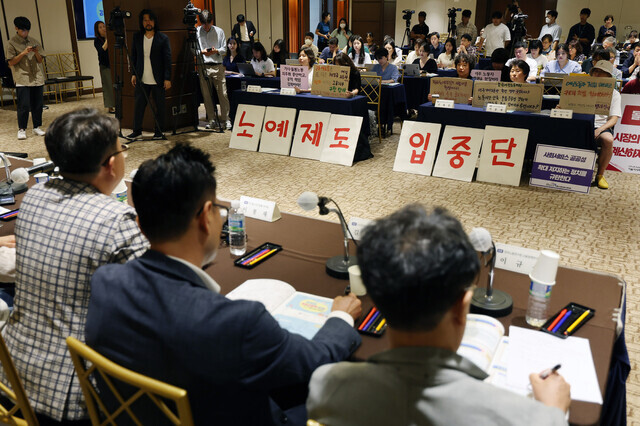hankyoreh
Links to other country sites 다른 나라 사이트 링크
Care workers, parents voice wariness about Korea’s plan to bring in Filipino domestic workers

“I’m worried that the policy will take away job opportunities from middle-aged Korean women and also lower the quality of the care work market.”
Kim Go-eun, a working mother with 3-year-old twins, voiced her concerns at a public hearing about the introduction of a scheme to bring in foreign national domestic helpers held by the Ministry of Employment and Labor at a hotel in central Seoul on Monday.
There, the ministry unveiled details of its pilot plan to introduce domestic workers to Korea from abroad. To begin with, the ministry plans to start a pilot project before the end of the year that will allow about 100 Filipino nationals to work as domestic workers in Korea.
At the event, which was organized by the Ministry of Employment and Labor to gather the opinions of possible service users and current domestic workers, various concerns were raised, including the stagnation of low wages for domestic workers, the decline in the quality of the care market, and possible discrimination against migrant workers.
In the “Pilot Plan for Non-professional Employment Visa (E-9) for Foreign Domestic Workers,” the Ministry of Employment and Labor stated that it plans to recruit around 100 foreign domestic workers in 2023 using the E-9 visa on a pilot basis.
Currently, the E-9 visa allows workers to work in the manufacturing, construction, agriculture, and some service industries, but the program will be expanded to include domestic services like childcare and housekeeping. The pilot program will be initially limited to Seoul.
The pilot will initially accept Filipino nationals. A government-certified domestic service provider will hire the foreign workers, and they will commute to and from the homes assigned by the agency. They are subject to the same labor laws (domestic workers act) as Korean nationals and are guaranteed a minimum wage.
To cover the additional costs of initial housing, transportation, and interpretation, the Seoul Metropolitan Government will provide a budget of 150 million won (US$117,000).
“The domestic service sector is experiencing a decrease in the number of domestic workers and an aging population, and the need to utilize foreign labor is increasing,” said Lee Sang-im, a foreign labor officer at the Ministry of Labor, emphasizing the need to introduce foreign domestic workers.
The government plans to allay the controversy over discrimination against migrant workers by ensuring minimum working conditions for foreign workers and hiring them through a certified agency.
However not everyone is on board with the plan.
“The government is still emphasizing how low the costs will be, so I’m worried that the starting point of differentiation will be the labor of foreign domestic workers,” said Choi Young-mi, the chairperson of a union of domestic and care workers, expressing doubts about the reason given for the need to introduce this system.
In fact, Choi Joong-hoon, a lawmaker with the minor party Transition Korea, introduced a bill in March to exclude foreign domestic workers from the minimum wage.
“The government talks about a shortage of domestic workers, but fewer people are willing to work due to poor working conditions in the domestic work sector,” said Bae Jin-kyung, the president of the Korean Women Workers’ Association, “In this situation, introducing migrant workers for the sole purpose of reducing market costs will result in the dismantling of the public nature of care.”
By Jang Hyeon-eun, staff reporter
Please direct questions or comments to [english@hani.co.kr]

Editorial・opinion
![[Column] When ‘fairness’ means hate and violence [Column] When ‘fairness’ means hate and violence](https://flexible.img.hani.co.kr/flexible/normal/500/300/imgdb/original/2024/0516/7417158465908824.jpg) [Column] When ‘fairness’ means hate and violence
[Column] When ‘fairness’ means hate and violence![[Editorial] Yoon must stop abusing authority to shield himself from investigation [Editorial] Yoon must stop abusing authority to shield himself from investigation](https://flexible.img.hani.co.kr/flexible/normal/500/300/imgdb/original/2024/0516/4417158464854198.jpg) [Editorial] Yoon must stop abusing authority to shield himself from investigation
[Editorial] Yoon must stop abusing authority to shield himself from investigation- [Column] US troop withdrawal from Korea could be the Acheson Line all over
- [Column] How to win back readers who’ve turned to YouTube for news
- [Column] Welcome to the president’s pity party
- [Editorial] Korea must respond firmly to Japan’s attempt to usurp Line
- [Editorial] Transfers of prosecutors investigating Korea’s first lady send chilling message
- [Column] Will Seoul’s ties with Moscow really recover on their own?
- [Column] Samsung’s ‘lost decade’ and Lee Jae-yong’s mismatched chopsticks
- [Correspondent’s column] The real reason the US is worried about Chinese ‘overcapacity’
Most viewed articles
- 1Could Korea’s Naver lose control of Line to Japan?
- 2[Column] Welcome to the president’s pity party
- 3[Column] US troop withdrawal from Korea could be the Acheson Line all over
- 4Naver’s union calls for action from government over possible Japanese buyout of Line
- 5[Editorial] Korea must respond firmly to Japan’s attempt to usurp Line
- 6Korea cedes No. 1 spot in overall shipbuilding competitiveness to China
- 7[Editorial] Yoon must stop abusing authority to shield himself from investigation
- 8[Column] When ‘fairness’ means hate and violence
- 9Korean opposition decries Line affair as price of Yoon’s ‘degrading’ diplomacy toward Japan
- 10Second suspect nabbed for gruesome murder of Korean in Thailand, 1 remains at large